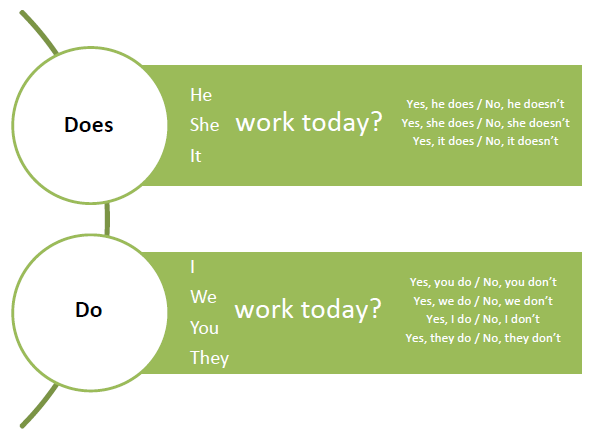Lesson One
Do – Present Tense
Singular | Plural |
I do | We do |
|---|---|
You do | You do |
He does | |
She does | They do |
It does |
The verb “do” can be used to make a statement: I do the laundry every weekend. …but it is usually used to make the present tense or the past tense negative: I don’t have any money. He didn’t go to the store yesterday. It’s also used when making questions: Do you know what time it is? Does he have a coat? |
Statement: I wear glasses Negative: I don’t see well without my glasses. Question: Do you wear glasses? |  I I |
Statement: You speak French. Negative: You don’t speak Chinese. Question: Do you speak Vietnamese? |  you you |
Statement: He works on a computer at work. Negative: He doesn’t work outside. Question: Does he like his job? |  he he |
Statement: She rides a bike to work. Negative: She doesn’t have a car. Question: Does she wear a helmet? Answer: Yes, she does. (notice the answer to the question uses “do.” ) |  she she |
Statement: It looks ripe. (ripe=ready to eat). Negative: It doesn’t grow in the winter in Minnesota. Question: Does it grow in the spring? Answer: Yes, it does. |
a strawberry = it |
Statement: We live in Minnesota. Negative: We don’t live in Canada. Question: Do we like Minnesota? Yes, we do. Or…. Yes, we like Minnesota. |  we we
|
Statement: You play football. Negative: You don’t play tennis. Question: Do you play football all year long? No, we don’t. We play in the fall. |  You |
Statement: They walk their dogs every day. Negative: They don’t take their cats for a walk. Question: Do they walk their dogs on a leash. Yes, they do. |
They |
The verb “do” is a very important verb. We use it to make the present tense, the present tense negative, and for asking questions. Examples: I do many things on the weekend. (present tense, “do” is the main verb) He doesn’t like to go to the store. (present tense negative, “like” is the main verb) Do you want to see a movie? (present tense question, “want” is the main verb) “Do” is often used as a main verb, but only for particular activities, such as housework, cleaning, studying, research, and shopping. Examples: I do the dishes every night. (do = wash) She does her grocery shopping at Cub. (do = go/finish) They do their homework at the library. (do = complete) The past tense form of “do” is “did.” Examples: I did the dishes last night. She did her grocery shopping at Cub. “Do” is also used for creating emphasis: Example: A: You don’t like this very much. B: No. I do like it!
|
Quiz
Complete these sentences with the correct form of the verb “do.”
1. He _____ his homework at the library.
2. ____ you like to play football?
3. Where ____ they live?
4. She _____ not want to eat that.
5. We _____ our laundry at the laundromat.
6. What ____ you do?
7. _____ it take long to get there?
8. _____ he live near the school?
9. I _____ not have any money.
10. The students _____ not have their books today.
Complete these sentences with the helping verb “do” and the main verb to make the negative:
Helping verb = do or does + not Main verb = live, shop, eat, go, see, etc.
1. He _____ _____in that house. (live)
2. Mary and John _____ _____ at that store any more. (shop)
3. It _____ _____ long to get there on the bus. (take)
4. I _____ _____ any more coffee. (want)
5. You _____ ______ enough time to get to work. (have)
6. She _____ ______ any milk from the store. (need)
7. We _____ ______ dinner every night at home. (eat)
8. The car _____ _____. (work)
9. Tom _____ ______ the newspaper in the morning. (read)
10. They _____ _____ shopping during the week. (go)


